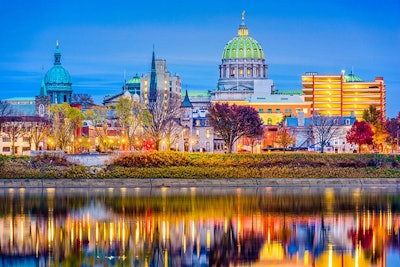
Two Democratic state senators from Pennsylvania have introduced a sprawling adult-use legalization bill that keeps small business development and social equity front and center in its regulatory provisions. S.B. 350 follows Gov. Tom Wolf’s recent cannabis reform press conference, in which he proudly extoled the virtues of legalization and nudged the legislature to get on with something comprehensive that he could sign—and quick.
Sam Wood III, reporter for The Philadelphia Inquirer, called this new bill “perhaps the most audacious piece of legislation proposed to legalize recreational cannabis for adults.”
Here are the tentpole goals of the legislation:
Prospective business owners could pursue a microgrower license (up to 150 plants, annual $250 permit), a dispensary license (no cap on the number of licenses, but individuals are limited to three apiece, each set at a $5,000 annual permit), a processing license ($1,000 annual permit), a delivery service license ($50 annual permit) and an on-site consumption license (can be independent or attached to a licensed dispensary, each set at a $1,000 annual permit).
Larger cultivation licenses would allow for up to 150,000 square feet of outdoor cultivation or 60,000 square feet of indoor cultivation. Each of those licenses would be set at a $100,000 application fee and a $10,000 annual permit.
Cultivation business owners may hold no more than one of the larger “grower” licenses and the “microgrower” licenses. “Limits on the capacity of growers, microgrowers, homegrowers, and processors may be adjusted by the department starting three years after legalization begins,” according to co-sponsor State Sen. Daylin Leach.
The cap is being conveyed as a limit on the reach of larger multi-state operators, which has become a point of contention in Pennsylvania regulatory oversight. Still, the limit affects smaller growers, too.
“I like the fact that they’re talking about microgrowing [licenses]. I’m not sure I like the idea of capping licenses at one per owner,” says Rachel Gillette, partner and chair of Greenspoon Marder’s cannabis law practice. “I don’t know that those types of restrictions actually work. I’m all for free-market competition, … because consumers benefit from free-market competition. … I don’t think we should force people into keeping their business so small that they can’t grow or they can’t expand.”
Current medical cannabis dispensary license-holders would be allowed to sell adult-use cannabis products, but the retail inventory and the supply chains must be kept separate from the medical side of the market.
State sales taxes would be set at 17.5 percent.
Adults could grow up to 10 cannabis plant at home—with an annual $50 permit.
As far as research opportunities and social justice provisions, S.B. 350 includes those, as well.
Higher-education institutions would be able to pursue a research license to grow cannabis for classes and certain approved programs; those cannabis products and plants must be destroyed.
Cannabis convictions would be expunged from individuals’ records, and anyone still incarcerated for cannabis-related crimes would have his or her sentence commuted under this new bill. The state would funnel up to $2 million toward small business grants for low-income entrepreneurs who have expunged cannabis convictions and who want to pursue a career in the cannabis industry.
“The department will offer a training program that will teach people how to grow and process cannabis, how to comply with state and federal cannabis laws, and how to start and run a small cannabis business,” according to Leach’s website. “Those who satisfactorily complete the program, who have a previous cannabis-related criminal conviction, and who have a household income below $80,000 may apply for state grants and interest free loans that they may use to start their own cannabis businesses.
“Revenue raised from taxation and permit fees will cover the costs associated with regulation, enforcement, training programs, grants, and loans. After costs, 95 percent of the remaining annual revenue—an estimated $500 million in the first full year of operation—will be appropriated to the state’s basic public education subsidy, which is distributed to school districts according to the state’s 2016 fair funding formula. School districts may use this funding increase to invest in their school districts or reduce local property taxes.”
The path to a social equity platform in this legislation hinges on a broader look at who has been impacted by cannabis prohibition and who can benefit from small business development in this new industry.
“The people who have been discussing social equity in the cannabis space are right to insist on its inclusion in cannabis legalization bills,” Gillette says. “The question that everybody has is: What should it look like? I think having a bill that maybe can provide grants to community programs that can help a lot of people as opposed to awarding a few licenses to a select few or the winners of a lottery—I think that’s a much better plan.”


























